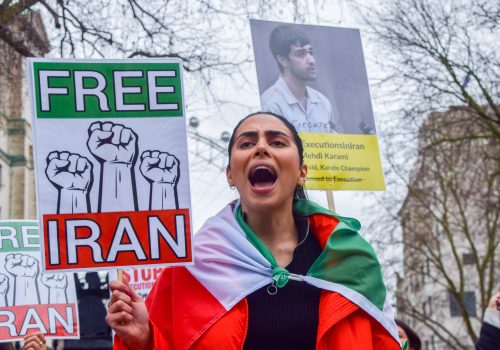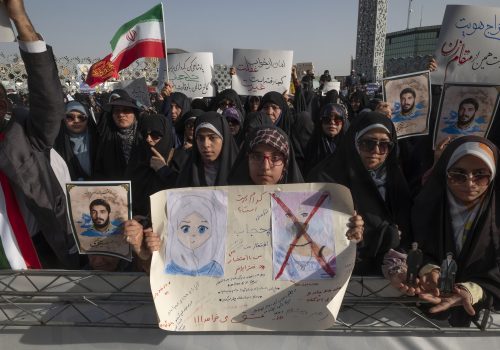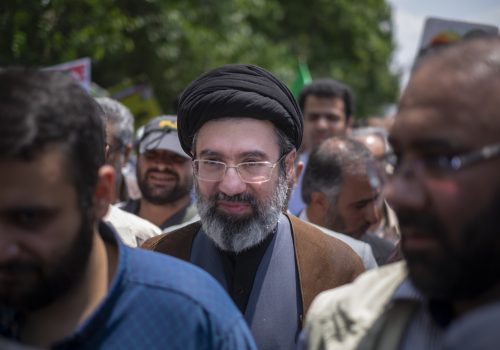Meet the secret IRGC entity purging university professors in Iran
In the past year, universities across Iran have been on the frontline of the Women, Life, Freedom revolution. It is no secret that Iranian students have led the charge against the Islamic Republic and, in turn, faced brutal suppression at the hands of the regime’s suppressive machinery, including the Islamic Revolutionary Guard Corp’s (IRGC) student paramilitary group known as the Student Basij Organization (SBO). What is less known, however, is the regime’s war on university professors and academic staff by a secret quasi-academic militia organization: The Professors Basij Organization (PBO).
Since the end of the peak of the protests in January, official state-backed data indicates that at least seventy university professors in Iran have been suspended or fired—though the real figure is closer to around 110. This war on academic staff coincided with the nationwide expulsion and suspension of thousands of students during the post-protest period.
The murder of twenty-two-year-old Mahsa Jina Amini, who was killed by the so-called morality police for “violating” mandatory hijab rules—not surprising, given its history with protests—would make universities in Iran one of the main pillars of protest against the clerical establishment.
While students spearheaded anti-regime demonstrations across campuses—including hosting rallies and sit-ins—university professors and academic staff initially held back from joining this charge. Their silence, however, was soon broken after students called out their hypocrisy, pleading with them to join the revolutionary movement. “Professors, professors, speak out, don’t be afraid” and “our professors are disgraced and accept humiliation,” students chanted. It would not be long before a flurry of academics across Iranian universities endorsed supporting the Women, Life, Freedom revolution.
Of course, this would not be without its consequences. The regime’s suppressive machinery waited until after the surge in protests to fully inflict revenge on dissenting Iranian students and academics alike.
Verified videos showing regime forces—mostly from the Basij—raiding university campuses, attacking students, and, in some cases, even opening fire on them have been widely circulated since the protests erupted in the fall of 2022. By January—a mere three months since the outbreak of protests—hundreds had been arrested, tortured, and sentenced to multiple years in prison.
The Islamic Republic has used various institutions to suppress and silence dissent across universities in Iran, including the Harasat, a branch of the intelligence ministry, and the IRGC’s Student Basij Organization, sanctioned by the European Union in May. Still, while the Herasat and SBO have primarily focused their efforts on targeting students, another shadowy organization, which, until now, has been ignored by Western nations, has been active in repressing and forcefully silencing dissenting academic staff: the PBO.
Formed in early 2001, the PBO was established as one of the special branches of the IRGC’s civil militia, the Basij, with the strong support of Supreme Leader Ayatollah Ali Khamenei. He said in a speech that year, “I advise developing the Basiji professors group. Pious brothers, sisters, and thank God there are many pious professors in our universities today, introduce them, recognize them, recruit them in one organization.”
Structurally, the PBO operates as a sub-branch of the IRGC, with its commanders always being an IRGC commander appointed by the head of the Basij. Its top-down structure can be broken down into three layers: the PBO headquarters, comprising of commanders from the IRGC’s Imam Hossein University in Tehran; the PBO centers, which are present across Iran’s leading universities and made up of university staff who are all active Basij members; and the PBO clubs that are spread across all other universities in Iran in accordance with the law.
The PBO was initially created to organize pro-regime professors nationwide and infiltrate all universities, operating as the IRGC’s eyes and ears across campus. The organization was significantly boosted after hardline Mahmoud Ahmadinejad became president in 2005. Ahmadinejad, himself a PBO member, would open the door for other members to serve in government, not least across Iran’s higher education ministry and other elements of the state bureaucracy. For example, Mohammad Mehdi Zahedi and Kamran Danshjoo were Ahmadinejad’s ministers of higher education in his first and second administrations, and Kamran Bagheri Lankarani, the minister of health and medical education, were all PBO affiliates.
As the 2009 post-election protests known as the Green Movement erupted, the PBO intensified its suppressive activities. PBO members began actively controlling and cracking down on students, most of whom opposed Ahmadinejad and viewed his “election” as fraudulent. One student at the time recalled this experience: “A professor from the Basij told me not to attend his class, citing my support for the 2009 protests. He said he’d ensure that ‘trash’ like me wouldn’t be allowed to attend the university.”
After a surge during the Ahmadinejad years, the PBO’s power would decrease from 2013 to 2021 under the presidency of Hassan Rouhani. In contrast, Rouhani gradually removed PBO members from the state bureaucracy and sidelined them from the university’s management—mainly because of factional rivalries and personal feuds with the IRGC.
This status quo would completely reverse with the de facto appointment of hardline cleric Ebrahim Raisi as president in 2021. Raisi’s presidency has turbocharged the PBO’s activities to unprecedented levels. The PBO supported Raisi’s presidential campaign and many of its members joined his administration when he formed his cabinet, much like the IRGC and the Basij. For example, Iran’s current higher education minister and minister for health and medical education are members of the PBO, as is Ali Zolfigol, Minister for Science, Technology, and Research, who vowed to “ensure the Islamization of universities…in this administration.” Having occupied the higher education and medical education ministries, the PBO members have been appointed as heads of universities and college deans.
For example, Dr. Mohammad Moqimi, a member of the PBO, has been appointed as the head of Tehran University. Consequently, Moqimi has appointed PBO members as college dean heads. Mohammadreza Hosnaei, the head of the art university PBO club, has become the dean of the arts college of Tehran University. Similarly, Abdolreza Saif, the PBO head of Tehran University, has now become the college dean of literature and humanities there.
It is worth noting that Iranian universities are not autonomous and are under complete state control (even so-called private ones). The Khamenei-run Supreme Council for Cultural Revolution (SCCR)—the highest authority over education and culture—directly appoints all university heads. As a result, PBO members have been appointed across senior managerial positions in state and semi-private universities nationwide. Naturally, this has resulted in a trickle-down effect. PBO university heads appointing other PBO affiliates to other managerial positions, including college deans and department heads, have been picked from the Professor Basij Organization. These individuals usually lack the necessary academic credentials or experiences but are awarded such positions due to their support for the regime’s Islamization of academia.
But what exactly is expected from PBO members? The suppressive activities of the PBO can roughly be broken down into three categories. The first relates to conducting surveillance against professors and students to identify dissenting voices. This was witnessed en masse during the Women, Life, Freedom protests.
According to students we interviewed studying at Allameh Tabataba’i University in Tehran, PBO professors deliberately held their university lectures on days and times when protests were planned to identify all absentees who would later be suspended or failed in class. PBO members also operated as informal agents for so-called “morality policing.”
Secondly, in tandem with these surveillance operations, PBO members sit on university administrative committees, abusing their authoritative positions to punish academic staff and students critical of the regime and reward those who support the regime.
Finally, alongside these activities, like every other branch of the Basij, PBO members are expected to use their positions to radicalize, recruit, and mobilize students and academic staff for the regime’s suppressive apparatus.
Of course, lucrative incentives are offered to PBO members to reward them for their service. As well as getting fast-tracked for senior university positions, Basji professors are also prioritized for state-funded scholarships to study abroad, not least at prestigious universities in Europe and the United States. Those who reap the rewards of such scholarships are expected to use their fast-tracked admissions to Western universities to infiltrate and penetrate academic institutions in the West on behalf of the regime. Such incentives are simultaneously coupled with compulsory ideological indoctrination for all PBO members to ensure that they are genuinely committed to the ideological cause of the regime and not simply materially driven. This official program of indoctrination—for example, one was titled, “The Plan of Guardianship of the Professors”—is overseen by the son of the late Ayatollah Mohammad Taqi Mesbah-Yazdi, the ideological godfather of the IRGC.
Having slipped under the radar of the West’s security agencies, the PBO has rapidly expanded its suppressive activities in the past few months. On behalf of the IRGC, it is in the process of waging what experts—both inside and outside of Iran—are referring to as the regime’s “Third Cultural Revolution” across universities nationwide. This major operation is resulting in the suspension, expulsion, and even detainment of Iranian professors and students who have criticized the regime or promoted “non-Islamic” ideals.
As part of this plan to “purify” universities, radical Basij members with virtually no academic experience or credentials have been appointed university lecturers. This includes Saeid Haddiyan, a Shia Islamist eulogist close to Khamenei, who has been teaching postgraduate classes at the College of Literature and Humanities at Tehran University, where Saif—the head of Tehran University PBO—has become the college dean.
For too long, the PBO has been ignored by the West. While the activities and operations of the PBO are inextricably tied to the IRGC and the Student Basij Organization—both sanctioned entities—it has yet to be designated by the United States or Europe. So long as this status quo exists, its war on innocent, pro-democracy Iranian professors and students will continue without any consequences.
Saeid Golkar is an associate professor in the Department of Political Science at the University of Tennessee at Chattanooga and a senior fellow on Middle East Policy at The Tony Blair Institute for Global Change in the UK.
Kasra Aarabi is the director of Islamic Revolutionary Guard Corps (IRGC) research at United Against Nuclear Iran (UANI) and is a nonresident scholar at the Middle East Institute. Follow him on X: @KasraAarabi.
Further reading
Thu, Feb 9, 2023
Forty-four years of an Islamic Republic. Many now regret the 1979 revolution.
IranSource By
While there are disagreements over many aspects of the 1979 revolution, most Iranians agree that the country is in a far worse situation because of it.
Mon, Sep 11, 2023
If the West wants to support Iranian women, it must cut diplomatic ties with Tehran
IranSource By
The success of the Woman, Life, Freedom revolution relies on increasing the crackdown costs until the Islamic Republic's grip on power falters, ultimately leading to its effective demise.
Tue, Jul 11, 2023
Why Khamenei’s son is not the next radical modernizer in the Middle East
IranSource By
A cohort of regime elites are hoping that Mojtaba Khamenei will transform the Islamic Republic from above.
Image: Iranian Basiji (Members of Basij Paramilitary force) university students are pictured in front of portraits of Founder of the Islamic Republic, Ayatollah Ruhollah Khomeini (L), and Iran’s Supreme Leader Ayatollah Ali Khamenei, hanged in front of the main gate of the University of Tehran before a rally to mark the thirty-third death anniversary of Ayatollah Khomeini, June 3, 2022. (Photo by Morteza Nikoubazl/NurPhoto)


